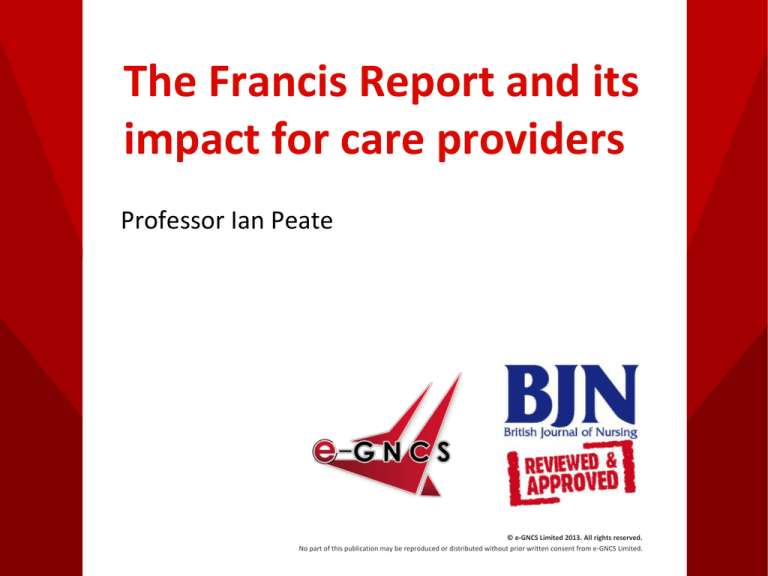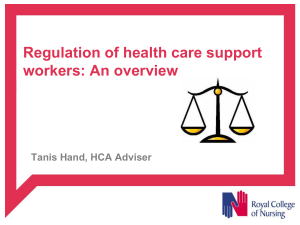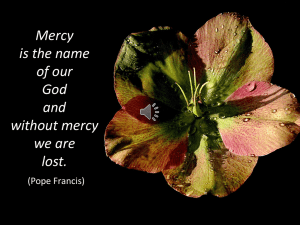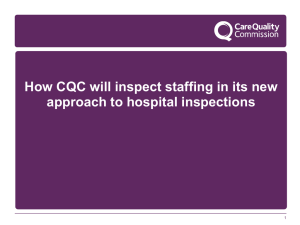
The Francis Report and its
impact for care providers
Professor Ian Peate
© e-GNCS Limited 2013. All rights reserved.
No part of this publication may be reproduced or distributed without prior written consent from e-GNCS Limited.
Aim and Objectives
The aim of the presentation is to:
Outline issues in the Francis report and relate
them to the care sector
At the end of the presentation you will be able to:
Consider the key issues and apply them to
your own setting
Reflect upon challenges and opportunities
Discuss the education and training needs of
HCSWs (Health Care Social Workers)
http://www.youtube.com/watch?v=0B0hEPU3Kt4
Any changes to hospital regulation following
the Francis report on the Mid Staffordshire
public inquiry must include care homes (The
Relatives and Residents Association)
Robert Francis QC
Is a lawyer
Was Francis the right person?
This is the second enquiry
Unnecessary deaths
All about the NHS (Mid Staffs)
Applicable across all sectors
Ignore this at your peril
290 recommendations
Robert Francis QC
Recommends sweeping changes for
regulation
Recommends the registration and regulation
of health care support workers
Proposes a statutory duty of candour, staff
will be obliged to speak out
Calls for legislation
Calls for criminal convictions
Criticisms
Leadership (or lack thereof)
The trust, their focus on targets and savings
The NMC
The CQC
Monitor
The RCN
Finance/quality balance
CQC and Monitor to work closer together
Staffing levels included in the CQC’s future
monitoring of care settings
Regulation
The right numbers of staff with the right skills
Safe staffing and a regulated
Regulation is not the panacea for all ills that befall
care home
Culture
Staff to speak up when they see examples of
poor care (whistle blowing)
Leadership
From the bedside to the board room
Fit for purpose
Demonstrate deep understanding of the
connection between patient outcomes and
staff engagement
Listen to patients and staff
Progression planning
Next steps
Government response (late March)
Vast majority of the people who provide care
are decent, hard working individuals
committed to provided the best possible
standard of care
Vast majority of people who deliver care give
good, quality care despite the severe
pressures that they are placed under due to a
lack of resources
Next steps
Pay greater attention to staffing levels if poor
care is to be eliminated
Make clear the impact that systematic failings
can have on the delivery of patient care
Five more hospitals under investigation
Does not require massive organisation
change, a renewed emphasis on what is truly
important - common values, intolerance of
non-compliance, commitment to openness
and candour at all times
Health Care Support Workers
Seven recommendations out of the 290
specifically relating to HCSWs. Four key areas:
?
?
?
?
Strengthening identification of HCSWs
Registration of HCSWs
National code of conduct for HCSWs
Set of common national standards for the
education and training of HCSWs
Strengthening identification
of HCSWs
Uniform description of HCAs (title)
Role clarity, and communication of this
Set of common national standards for the
education and training of HCSWs
Registration of HCSWs
No unregistered person should be permitted
to provide care ‘for reward’ in a care home
setting, unless they are members of their
own family or have a genuine social
relationship
Mandatory vs Voluntary registration
Voluntary register has little or no advantage
for the public
Regulator should be the same as that for RNs
(NMC)
National Code of Conduct
Code of conduct aligned to standards of
education and training
Scotland has one
Wales has one
In England Skills for Health and Skills for Care
are working on one
Common national standard for
education and training of HCSWs
Consistency in education and training
Will help to ensure patient safety, the whole
workforce can feel confident in HCSW
abilities
Provides access to further education and
training as needed for their role
Career progression
In England Skills for Health and Skills for Care
are working on minimum standards
Code of practise for employers
of HCSW
Scotland
Plays a major part in public assurance around
the employment of HCSWs
Builds on the fundamental principles of
patient safety and public protection
Supported by existing systems of clinical
governance and staff governance
Failings in nursing care (Francis)
Undervaluing of the nursing task and those
who perform it
Deficiencies in initial and continuing training
Poor recruitment
Poor leadership
Inadequate staffing
Declining professionalism
THANK
YOU
Please feel free to ask questions
www.e-gncs.co.uk







